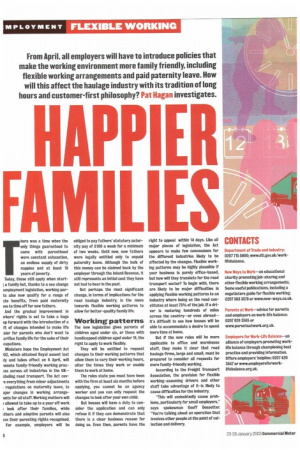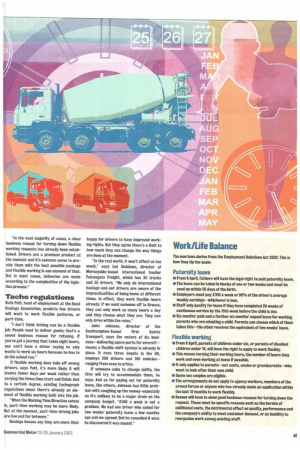HAPPIER FILM ES
Page 44

Page 45

If you've noticed an error in this article please click here to report it so we can fix it.
From April, all employers will have to introduce policies that make the working environment more family friendly, including flexible working arrangements and paid paternity leave. How will this affect the haulage industry with its tradition of long hours and customer-first philosophy? Pat Hagan investigates.
Ihere was a time when the only things guaranteed to come with parenthood were constant exhaustion, an endless supply of dirty nappies and at least 18 years of poverty. Today, those still apply when start; a family but, thanks to a sea change employment legislation, working parts also now qualify for a range of ate benefits, from paid maternity we to time off for new fathers.
And the gradual improvement in irkers' rights is set to take a huge op forward with the Introduction of a ft of changes Intended to make life sier for parents who don't want to crifice family life for the sake of their cupations.
Ministers hope the Employment Act i02, which obtained Royal assent last ily and takes effect on 6 April, will emote family-friendly working prac;es across all industries in the UKcluding road transport. The Act coy's everything from minor adjustments regulations on maternity leave, to ajor changes in working arrangeents for all staff. Working mothers will i allowed to take up to a year off work i look after their families, while ithers and adoptive parents will also we their parenting rights recognised. For example, employers will be obliged to pay fathers' statutory paternity pay of £100 a week for a minimum of two weeks. Until now, new fathers were legally entitled only to unpaid paternity leave. Although the bulk of this money can be claimed back by the employer through the Inland Revenue, it still represents an initial cost they have not had to bear In the past.
But perhaps the most significant change, In terms of implications for the road haulage Industry, is the move towards flexible working patterns to allow for better-quality family life.
Working patterns
The new legislation gives parents of children aged under six, or those with handicapped children aged under 18, the right to apply to work flexibly.
They will be entitled to request changes to their working patterns that allow them to vary their working hours, alter the times they work or enable them to work at home.
The rules state you must have been with the firm at least six months before applying, you cannot be an agency worker and you can only request the changes to look after your own child.
But bosses will have a duty to consider the application and can only refuse it if they can demonstrate that there is a clear business reason for doing so. Even then, parents have the right to appeal within 14 days. Like all major pieces of legislation, the Act appears to make few concessions for the different industries likely to be affected by the changes. Flexible working patterns may be highly plausible if your business is purely office-based, but how will they translate for the road transport sector? To begin with, there are likely to be major difficulties In applying flexible working patterns to an industry where being on the road constitutes at least 75% of the job. If a driver is motoring hundreds of miles across the country—or even abroad— it's difficult to see how bosses will be able to accommodate a desire to spend more time at home.
But if the new rules will be more applicable to office and warehouse staff, they make it clear that road haulage firms, large and small, must be prepared to consider all requests for more family-friendly working.
According to the Freight Transport Association, the provision for flexible working-assuming drivers and other staff take advantage of It-is likely to cause difficulties for the Industry.
"This will undoubtedly cause problems, particularly for small employers," says spokesman Geoff Dossetter. 'You're talking about an operation that involves other people at the point of collection and delivery.
CONTACTS
Department of Trade and Industry; 0207 715 5000; www.dti.gov.uk/worklifebalance.
New Ways to Work—an educational charity promoting job-sharing and other flexible working arrangements. Some useful publications, including a negotiators guide for flexible working: 0207 503 3578 or www.new-ways.co.uk.
Parents at Work—advice for parents and employers on work-life balance: 0207628 3565 or www.parentsatwork.org.uk.
Employers for Work-Life Balance—an alliance of employers promoting worklife balance through championing best practice and providing information. Offers employers' helpline: 0207 420 3847 or www.employersforworkIlfebalance.org.uk. "In the vast majority of cases, a clear business reason for turning down flexible working requests has already been established. Drivers are a premium product at the moment and it's common sense to provide them with the best possible package and flexible working is one element of that. But In most cases, deliveries are made according to the complexities of the logistics process."
Tacho regulations
Ruth Pott. head of employment at the Road Haulage Association, predicts few drivers will want to work flexible patterns, or part-time.
"I don't think driving can be a flexible Job. People need to deriver goods; that's a sound business reason for refusing. If you've got a journey that takes eight hours. you can't have a driver saying he only wants to work six hours because he has to do the school run."
If flexible working does take off among drivers, says Pott. it's more likely it will Involve fewer days per week rather than varying the times they start and finish. And to a certain degree, existing tachograph regulations mean there's already an element of flexible working built into the job. When the Working Time Directive comes in, part-time working may be more likely. But at the moment, part-time driving jobs are few and far between."
Haulage bosses say they are more than happy for drivers to have improved working rights. But they agree there's a limit to how much they can change the way things are done at the moment.
"In the real world, It won't affect us too much," says Len Beddows, director of Merseyside-based international haulier Falcongate Freight, which has 30 trucks and 30 drivers. "We only do international haulage and our drivers are aware of the impracticalities of being home at different times. In effect, they work flexible hours already. If we send someone off to Greece, they can only work so many hours a day and they choose what they are. They can only drive within the rules."
John Johnson, director of the Southampton-based firm Saints Transport, says the nature of its business—delivering spare parts for aircraft— means a flexible shift system is already In place. It runs three depots in the UK, employs 250 drivers and 180 vehicles— ranging from vans to artics.
If someone asks to change shifts, the firm will try to accommodate them, he says. And as for paying out for paternity leave, like others, Johnson has little problem with coughing up the money-especially as it's unlikely to be a major drain on the company budget. "£100 a week is not a problem. We had one driver who asked for two weeks' paternity leave a few months ago and we agreed. But he cancelled it once he discovered it was unpaid."
Work/Life Balance
The new laws derive from the Employment Relations Act 2002, This is how they tip the scale:
Paternity leave
• From 6 April, fathers will have the legal right to paid paternity leave.
• The leave can be taken In blocks of one or two weeks and must be used up within 56 days of the birth.
• Employers must pay 1100 a week or 90% of the driver's average weekly earnings—whichever is less.
• Staff only qualify for leave if they have completed 26 weeks of continuous service by the 15th week before the child is due.
• Six months' paid and a further six months' unpaid leave for working parents who are adopting a child. Parents can choose which of them takes this—the other receives the equivalent of two weeks' leave.
Flexible working
• From 6 April, parents of children under six, or parents of disabled children under 18, will have the right to apply to work flexibly.
• This means varying their working hours, the number of hours they work and even working at home If possible.
• It only applies to parents—not aunts, uncles or grandparents—who want to look after their own child.
• Same sex couples are eligible.
• The arrangements do not apply to agency workers, members of the armed forces or anyone who has already made an application within the last 12 months to work flexibly, • Bosses will have to show good business reasons for turning down the request. These must be specific reasons such as the burden of additional costs, the detrimental effect on quality, performance and the company's ability to meet customer demand, or an Inability to reorganise work among existing staff.




























































































































































